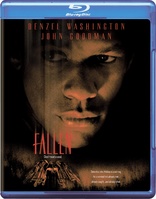Fallen Blu-ray Movie
HomeFallen Blu-ray Movie 
Warner Bros. | 1998 | 124 min | Rated R | Aug 14, 2012Movie rating
7 | / 10 |
Blu-ray rating
| Users | 4.5 | |
| Reviewer | 3.5 | |
| Overall | 3.7 |
Overview
Fallen (1998)
Homicide detective John Hobbes witnesses the execution of serial killer Edgar Reese. Soon after the execution the killings start again, and they are very similar to Reese's style.
Starring: Denzel Washington, John Goodman, Donald Sutherland, Embeth Davidtz, James GandolfiniDirector: Gregory Hoblit
| Supernatural | Uncertain |
| Thriller | Uncertain |
| Mystery | Uncertain |
| Horror | Uncertain |
Specifications
Video
Video codec: MPEG-4 AVC
Video resolution: 1080p
Aspect ratio: 2.41:1
Original aspect ratio: 2.39:1
Audio
English: DTS-HD Master Audio 5.1 (48kHz, 24-bit)
French: Dolby Digital 5.1 (640 kbps)
Spanish: Dolby Digital 5.1 (640 kbps)
Spanish: Dolby Digital Mono
German: Dolby Digital 5.1 (640 kbps)
Portuguese: Dolby Digital Mono
Spanish 5.1=Castillian
Subtitles
English SDH, French, German SDH, Portuguese, Spanish, Danish, Dutch, Finnish, Norwegian, Swedish
Discs
50GB Blu-ray Disc
Single disc (1 BD)
Playback
Region free
Review
Rating summary
| Movie | 3.0 | |
| Video | 4.5 | |
| Audio | 4.0 | |
| Extras | 2.0 | |
| Overall | 3.5 |
Fallen Blu-ray Movie Review
. . . And Can't Get Up to Heaven
Reviewed by Michael Reuben August 20, 2012Fallen was the sophomore feature film from director Gregory Hoblit, immediately following the well-received Primal Fear and right before the superb Frequency, and it should be much better than it is. The screenplay is a combination of police procedural (Hoblit's specialty) and supernatural thriller by Nicholas Kazan, the Oscar-nominated author of Reversal of Fortune. The cast is led by Denzel Washington, who is backed by such notable talents as James Gandolfini, John Goodman, Donald Sutherland and, in a small but critical role, Elias Koteas, a king of creepiness. The cinematography, production design and other technical elements have been executed with flawless craftsmanship. So why doesn't the film leave a more lasting impression? Why does the tension dissipate as soon as the credits roll (if not before)? It's impossible to explore these questions fully without spoilers that would ruin all the enjoyment of a first viewing (and the first viewing of Fallen is by far the best). But this much I can say: Whenever dealing with a film like Fallen that relies on biblical notions of good and evil, one cannot help but compare it to the master template for such movies, The Exorcist. The usual weakness of subsequent films in the vein of William Friedkin's demonic masterpiece is that they skimp on character, whereas Friedkin made sure that the audience really knew the characters whose lives were being torn apart by evil forces. Fallen has the same strength, as should be evident from the A-list cast, who deliver credible performances embodying three-dimensional people. No, the problem lies elsewhere, and I'll come back to it at the end.
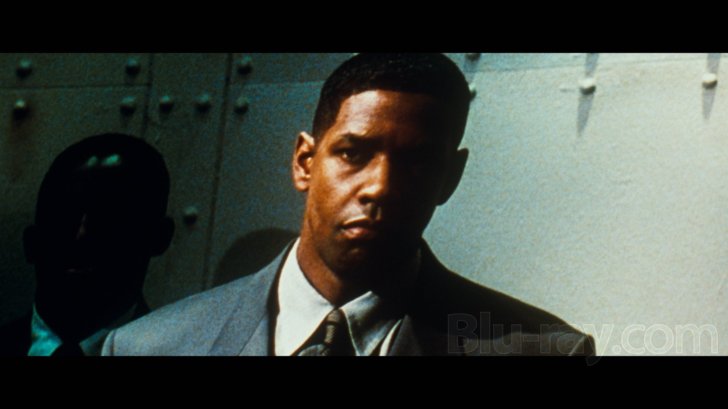
Det. John Hobbes (Washington) is an honest, dedicated cop in a major American city. (By design, the city is never identified, but the film was shot in and around Philadelphia.) His most recent accomplishment is the capture of serial killer Edgar Reese (Elias Koteas). After a short prologue that sets up the film as an extended flashback, the story opens with Hobbes visiting Reese on death row the night before his execution. Reese is unaccountably jovial, as a documentary crew films his final hours. He chatters at Hobbes, making vague threats and unintelligible remarks, including statements in what sounds like gibberish but will later be discovered to be ancient Syrian-Aramaic. In the gas chamber the next day, Reese rants at the witnesses, including Hobbes, and sings "Time Is on My Side", a song made famous by the Rolling Stones. Just before Reese dies, we see his point of view, and it's bizarrely distorted in a manner that the filmmakers dubbed "demon vision". As Reese dies, this point of view floats free and settles on someone else. Within days after the execution, Hobbes and his partner Jones (Goodman) are being summoned to the scenes of apparent copycat murders that bear Reese's signature. Even more unsettling, clues are left at the scenes that refer directly to statements Reese made to Hobbes the night before he died. Hobbes's investigations lead him to Gretta Milano (Embeth Davitz, looking nothing like the prim English wife she played on Mad Men), the daughter of another decorated detective who committed suicide. Now a teacher of religious studies, Gretta lives in a house where she is surrounded by images and figurines of angels. At first, she doesn't want to speak to Hobbes, but he keeps returning with more questions, as strangers address him familiarly on the street, in the same distinctive tone and manner as Reese. Though not someone prone to believe in the supernatural, Hobbes is ultimately forced to accept that the "spirit" that used to inhabit Reese is now loose and roaming the world, passing from person to person by touch. Hobbes can see it happening even in his own precinct house, where fellow detective Lou (Gandolfini) suddenly breaks into "Time Is on My Side", which is then passed from one cop to another as they brush up against each other. Afterward, Lou doesn’t even remember singing. As Hobbes tries to wrap his practical policeman's mind around these events, he realizes that his own family is in danger: his mentally challenged brother, Art (Gabriel Casseus), and his nephew, Sam (Michael J. Pagan). Worse, Hobbes's ability to protect them is compromised when he is suspended by his lieutenant (Sutherland), after being decoyed by the demon into shooting a civilian. With Gretta's help, Hobbes devises a desperate plan to confront the demon, which he has by now identified, and exploit its only weakness according to what he's found in obscure texts. Early in his career, Alfred Hitchcock is supposed to have been asked why his endangered protagonists didn't just go the police, as a result of which the Master of Suspense always made sure to include a good explanation in later films, either by making the hero a wanted man or by showing the police to be ineffectual. A similar question applies to Fallen. It eagerly borrows the Christian cosmology of good and evil, angels cast out of heaven into darkness and the struggle for humanity's soul; its demonic villain even makes biblical references. But when it comes to the earthly institutions of Christianity, the film becomes remarkably shy. The closest it gets is a scene in which Hobbes asks a nun with whom he happens to be sharing a train a basic question about the Book of Revelation. When Hobbes himself is asked about his religion (by Gretta), he ducks the question. Now, I'm not suggesting that Hobbes should have run off to join the priesthood, or hidden himself and his family on holy ground (although he and Gretta do meet in a church), or begged the local bishop for an army of Christian soldiers. My point is that storytellers proceed at their peril when they pick and choose among the fundamental elements of an established body of beliefs. The Exorcist worked (and still does), because it involved genuine Catholics—the priest, Father Karras, and the layperson, Chris MacNeil—confronting an eruption in modern life of an ancient evil they had both regarded as mere metaphor. One does not have to be a Catholic or even a Christian to participate in that drama or be scared silly by it. In Fallen, by contrast, Det. Hobbes never seems to treat the demon he's fighting as anything more than an advanced form of "perp". A supervillain he may be, but defeating him still boils down to understanding his motive, method and opportunity, then looking for weaknesses. When was the last time you saw a hero battle a fallen angel, and no one seriously talked about "faith"?
Fallen Blu-ray Movie, Video Quality 
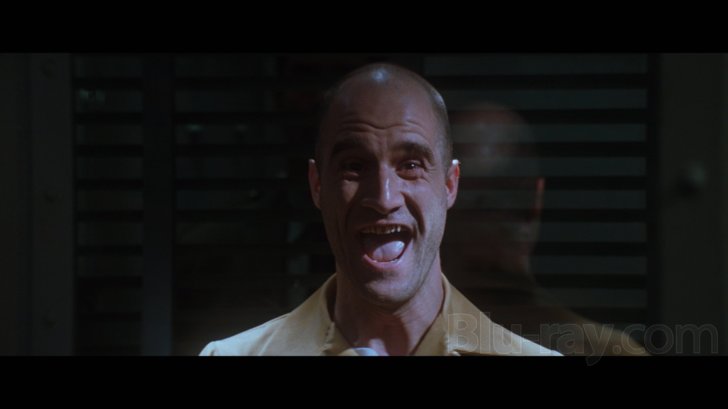
Warner's 1080p, AVC-encoded Blu-ray presents Newton Thomas Sigel's sumptuous widescreen Panavision photography to its best advantage. As he demonstrated in The Usual Suspects, Sigel can create a rich look even with a low budget; give him real money, and he delivers the kind of image that makes Blu-ray afficionados sit up and take notice, assuming it's handled properly, as it has been here. The rich, dark earth tones of the Philadelphia locations and the interiors built to coordinate with them are reproduced with silky smoothness, as are the cool blues and whites that Sigel frequently uses to set off Det. Hobbes, thereby emphasizing his essential isolation. Blacks are rich and inky, particularly in the film's critical nighttime finale, and detail is superior even in darker areas of the frame. Colors are distinct but not oversaturated. There is no indication of artificial sharpening or grain reduction, although the image's grain structure is so fine that it's barely noticeable. No compression artifacts were evident. An entirely different look characterizes the brief but frequent insert shots of "demon vision". In addition to geometric distortion, these reflect deliberate overexposure, "wrong" colors and oversaturation. They're supposed to appear non-human and they succeed.
Fallen Blu-ray Movie, Audio Quality 
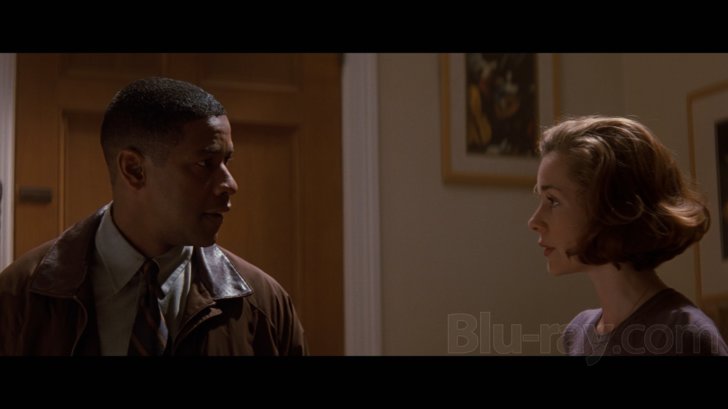
The film's DTS-HD MA 5.1 track reveals distinct but low-key rear channel effects right from the opening sequence at the prison where Reese is to be executed and helicopters are circling overhead patrolling the crowds demonstrating below. Other effects such as thunder and the demon's rush through crowds gain impact from judicious use of the rear channels. The track also makes more frequent use of left and right separations than one typically finds in a major feature. Dialogue is always clear, and the sound editors have cleverly conspired with the film editor to "overlap" the dialogue from one scene into the previous one, which has the purposefully disorienting effect of leaving viewers momentarily unsure whether they're hearing voiceover or something else. (There's voiceover as well.) The atmospheric score by Tan Dun (Oscar winner for Crouching Tiger, Hidden Dragon) has been subtly layered into the mix so that it functions as a presence instead of an overbearing commandant telling the audience when to be frightened.
Fallen Blu-ray Movie, Special Features and Extras 
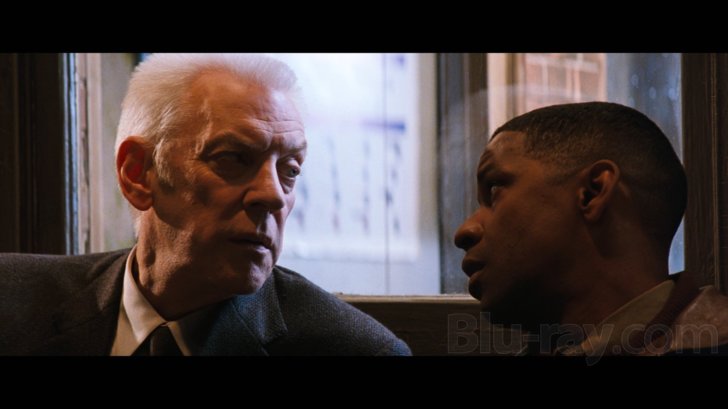
The extras have been ported over from the 1998 DVD, with the exception of cast and crew bios and brief "production notes". (The DVD listed three "TV spots", but in fact these were not on the disc.)
- Commentary with Director Gregory Hoblit, Screenwriter Nicholas Kazan and Producer Charles Roven: Roven dominates the discussion, which is unfortunate, because producers are often the least interesting among commentators. They can tell tales of logistical disaster (and Roven has a few beauties), but they're not sufficiently involved in the details of production to illuminate its intricacies. The most interesting comments involve the development of the film's visual style by cinematographer Sigel, especially the so-called "demon vision" using Ektachrome film (a process to which Sigel would return a few years later for Three Kings). Nearly all the commentary's best items have been anthologized in the "trivia" section of the film's IMDb entry.
- Theatrical Trailer (SD; 1.78:1, enhanced; 2:27): Like most trailers, it gives away too much. It also contains a shot from a dropped subplot involving Gretta Milano.
Fallen Blu-ray Movie, Overall Score and Recommendation 
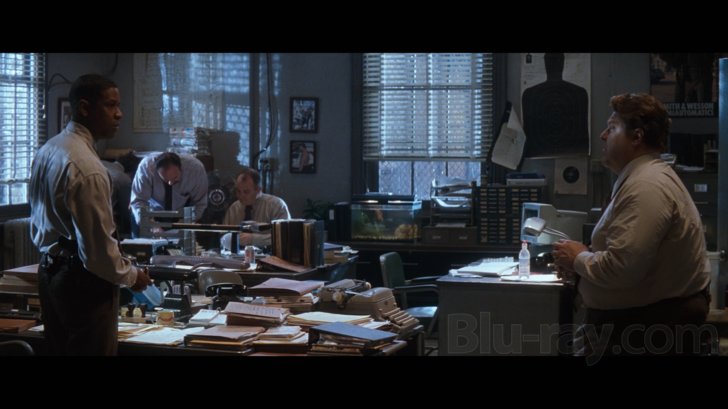
Note to aspiring screenwriters: Consider inventing your supernatural villains, either by borrowing creatively from old legends (as Sam Raimi did for The Evil Dead films) or by a rough sketch that the audience can fill in with its own imagination, as Joss Whedon and Drew Goddard did recently with The Cabin in the Woods (thereby following a template that Whedon has used successfully for years). There's no point in taking on all the baggage of an established religion unless you intend to use it, as Fallen did not. When you make up your own demons, you put your protagonist and the audience in the same position, because no one knows the adversary. The unknown is always more frightening. On technical grounds, the Blu-ray of Fallen is recommended, but I suggest a rental, because the replay value isn't high.
Similar titles
Similar titles you might also like

The Prophecy
1995

Psych:9
2010

Witchboard
1986

The Comeback
1978

Don't Answer the Phone!
1980

Pale Blood
Standard Edition
1990

Don't Let Go
2019

Tower of Evil
Horror on Snape Island | Beyond the Fog | Remastered
1972

Saw 4K
2004

Tenebrae 4K
Standard Edition
1982

Happy Death Day 4K
2017

Deep Red 4K
Profondo rosso
1975

The Medusa Touch
1978

Jigsaw 4K
2017

The Ninth Gate
1999

Gothika
2003

Mirrors
Unrated
2008

Devil 4K
2010

Deliver Us from Evil
2014

Child's Play 4K
1988
